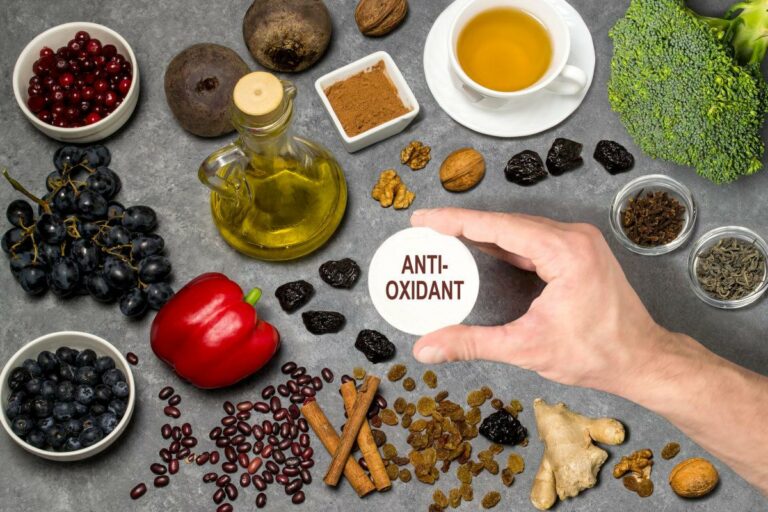Introduction
Antioxidants have gained significant attention in recent years for their potential health benefits. But what exactly are antioxidants, and why are they considered a big deal? In this comprehensive guide, we will explore the world of antioxidants, their role in our health, and how they can help combat oxidative stress and protect against various diseases. We will delve into the different types of antioxidants, their food sources, and the best ways to incorporate them into your diet. By understanding the importance of antioxidants, you can make informed choices to support your overall well-being.
Section 1: Understanding Oxidative Stress
1.1 What is Oxidative Stress?
Oxidative stress occurs when there is an imbalance between free radicals and antioxidants in the body. Free radicals are highly reactive molecules that can cause damage to cells, DNA, and other vital components. When the production of free radicals overwhelms the body’s antioxidant defenses, oxidative stress can occur.
1.2 The Impact of Oxidative Stress on Health
Oxidative stress has been linked to numerous chronic conditions, including heart disease, cancer, neurodegenerative diseases, and aging. It can contribute to the development of inflammation, DNA damage, and cellular dysfunction. Antioxidants play a crucial role in neutralizing free radicals and reducing oxidative stress.
Section 2: What Are Antioxidants?
2.1 Defining Antioxidants
Antioxidants are compounds that can neutralize free radicals, thereby preventing or reducing oxidative damage. They work by donating electrons to unstable free radicals, stabilizing them and preventing them from causing harm to cells and tissues.
2.2 Different Types of Antioxidants
There are various types of antioxidants, including vitamins (such as vitamin C, vitamin E, and beta-carotene), minerals (such as selenium and zinc), and phytochemicals (such as flavonoids, polyphenols, and carotenoids). Each type of antioxidant has its unique properties and mechanisms of action.
Section 3: Benefits of Antioxidants
3.1 Protection Against Chronic Diseases
Antioxidants have been studied extensively for their potential role in reducing the risk of chronic diseases. They can help protect against cardiovascular disease, certain cancers, neurodegenerative disorders, and age-related macular degeneration, among others.
3.2 Anti-Inflammatory Effects
Oxidative stress and inflammation often go hand in hand. Antioxidants can help mitigate inflammation by neutralizing free radicals and reducing the production of pro-inflammatory molecules.
3.3 Skin Health and Aging
Antioxidants play a significant role in maintaining healthy skin by protecting against oxidative damage caused by environmental factors such as UV radiation and pollution. They can help reduce signs of aging, promote collagen synthesis, and improve overall skin health.
Section 4: Food Sources of Antioxidants
4.1 Fruits and Vegetables
Colorful fruits and vegetables are rich in antioxidants. Examples include berries, citrus fruits, leafy greens, cruciferous vegetables, and peppers. Aim to incorporate a variety of these foods into your diet to maximize your antioxidant intake.
4.2 Nuts and Seeds
Nuts and seeds, such as almonds, walnuts, chia seeds, and flaxseeds, are excellent sources of antioxidants, particularly vitamin E and various phytochemicals. They can be enjoyed as snacks or added to meals and recipes.
4.3 Herbs and Spices
Many herbs and spices boast high antioxidant content. Turmeric, cinnamon, ginger, oregano, and cloves are just a few examples. Sprinkle them on your dishes or use them to season your meals for added antioxidant benefits.
Section 5: Incorporating Antioxidants Into Your Diet
5.1 Balanced and Colorful Meals
Create balanced and colorful meals that include a variety of antioxidant-rich foods. Aim to have a colorful plate with different fruits and vegetables, such as blueberries, spinach, tomatoes, and bell peppers. Incorporate whole grains, lean proteins, and healthy fats to make a well-rounded meal.
5.2 Smoothies and Juices
Prepare antioxidant-packed smoothies and juices using a combination of fruits, vegetables, and herbs. You can experiment with different recipes and add antioxidant-rich ingredients like berries, kale, spinach, and a sprinkle of cinnamon or turmeric for an extra boost.
5.3 Antioxidant-Rich Snacks
Opt for healthy snacks that are rich in antioxidants. Nuts and seeds, like almonds and sunflower seeds, provide a good dose of vitamin E and other antioxidants. Dark chocolate, with its high cocoa content, is also a great choice as it contains flavonoids, which are powerful antioxidants.
5.4 Tea and Herbal Infusions
Enjoy antioxidant-rich beverages like green tea, matcha, and herbal infusions. Green tea, in particular, is known for its high content of catechins, a type of antioxidant. Herbal teas like chamomile, rooibos, and hibiscus also offer antioxidant benefits.
Section 6: Supplementing with Antioxidants
6.1 Considerations for Supplementation
While obtaining antioxidants from a balanced diet is ideal, some individuals may benefit from antioxidant supplements. It’s important to consult with a healthcare professional before starting any supplementation regimen, as they can provide personalized advice based on your specific needs.
6.2 Choosing Quality Supplements
If you opt for antioxidant supplements, choose high-quality products from reputable brands. Look for third-party testing, quality certifications, and transparent ingredient lists. Remember that supplements should complement a healthy diet, not replace it.
6.3 Potential Risks and Interactions
Antioxidant supplements, especially in high doses, may have potential risks and interactions with certain medications. It’s essential to discuss your supplement use with a healthcare professional to ensure they are safe and appropriate for your individual circumstances.
Conclusion:
Antioxidants play a vital role in protecting our bodies against oxidative stress and reducing the risk of chronic diseases. With their ability to neutralize free radicals and combat inflammation, they are an essential component of a healthy lifestyle. By incorporating a variety of antioxidant-rich foods into your diet, you can harness the power of these beneficial compounds. Remember that a balanced and colorful diet, along with a healthy lifestyle, is the best approach to reaping the benefits of antioxidants. So, make sure to fill your plate with vibrant fruits and vegetables, sip on antioxidant-rich beverages, and consider supplementation under the guidance of a healthcare professional. By embracing the big deal about antioxidants, you can support your overall well-being and promote a healthier, more vibrant life.
- What’S the Big Deal about Antioxidants - June 21, 2023

